10 Best Whole House Generators in 2022
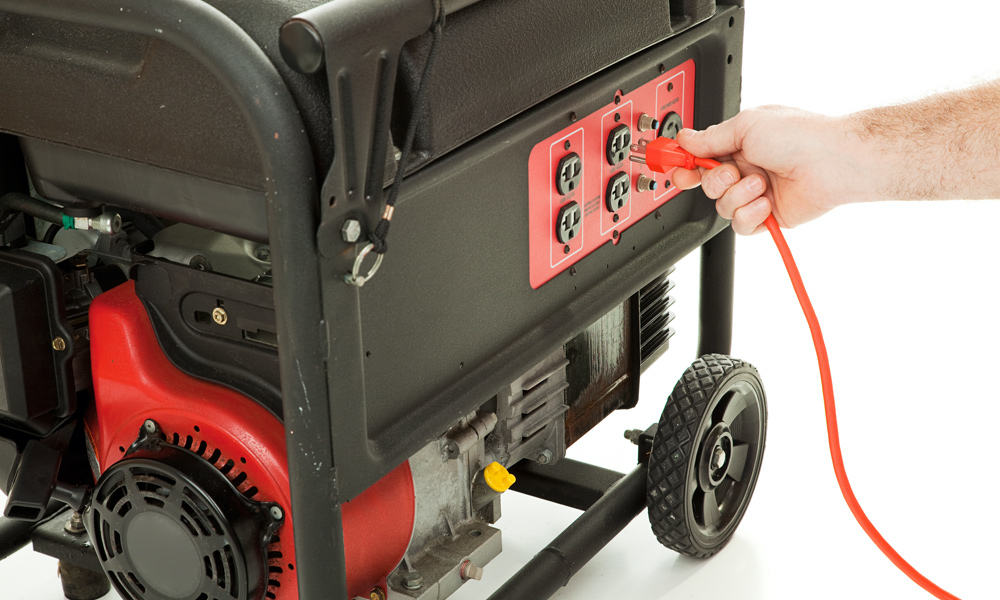
When the power goes out, and you are stuck without a direct supply of electricity, having a decent generator could be the only way you are able to keep powering your important appliances. A decent whole house generator won’t just act as a one-off power source, but stick around in the long-term as a reliable and consistent way to power your entire house if anything ever goes wrong. Of course, with so many different generator models out there to choose from, it can be difficult to know what sort of equipment would serve you best in power outages or blackouts.
Below is our list of the ten best whole house generator options on the market, along with other details that might be worth knowing or considering.
View the Best Whole House Generator, Below.
- DuroMax XP12000EH Dual Fuel Portable Generator
- Generac 7043 Home Standby Generator
- Westinghouse WGen9500 Portable Generator
- Champion 100174 Home Standby Generator
- All Power America APGG10000 Power Backup Generator
- Generac 70432 Home Standby Generator
- Briggs & Stratton 30795 P4500 Inverter Generator
- Generac 5735 Portable Generator
- Briggs & Stratton 40531 12kW Standby Generator
- Generac 5685 Air-Cooled Standby Generator
1. DuroMax XP12000EH Dual Fuel Portable Generator

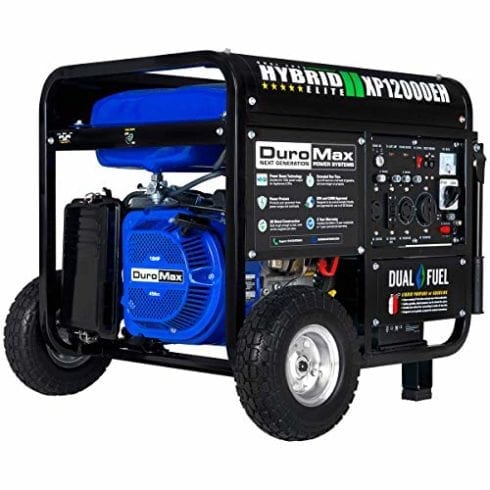
This powerful and reliable generator offers up to 9500 watts of running power and a maximum starting surge of 1200 watts, giving you more than enough energy to keep both smaller and larger appliances running in the long-term. The body has a range of outlet types: a heavy-duty outlet, two different twist locks, a standard household outlet, all of which can help you keep different devices and tools powered properly.
On the side of the generator is a power panel containing various breakers, making it easy to avoid overloading or switch off the power at the source if something is going wrong. Not only that, but the small wheels make it easy to wheel the generator around on flat ground.
This is an excellent choice of generator if you need a good reserve option for your home, working with both propane and gasoline as needed.
Check Price on Amazon ➞2. Generac 7043 Home Standby Generator
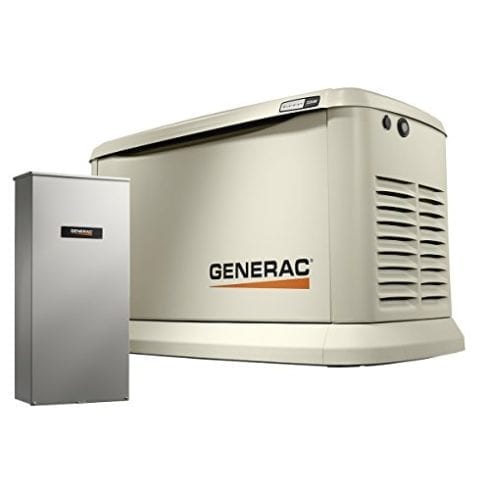
The size of this whole house generator makes sense when you look at what it can offer: once installed, it can provide anywhere from 9 to 22 kilowatts of power from a connection to a supply of gas. The aluminum outer shell can endure all types of weather while still giving you access to all three important sides of the body, and the built-in LED indicators tell you the current generator status at a glance.
An included 200 amp transfer switch allows you to quickly connect and disconnect the power at will without needing to shut the generator off, and you can use the Mobile Link system to monitor it from your mobile phone if you need to.
If you prefer your generators to be big, powerful and installed directly on your property, this is one of the best options on the market at the moment.
Check Price on Amazon ➞3. Westinghouse WGen9500 Portable Generator
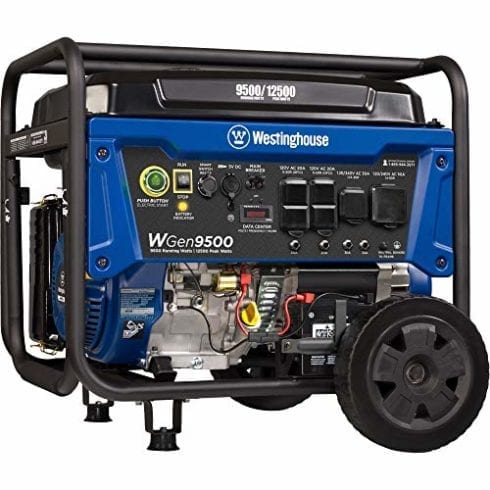
This industrial-level super-duty generator is incredibly durable, using a cast iron sleeve and metal frame to prevent most types of damage while you are using it around the house. It can run for up to 12 hours from a full 6.6-gallon tank with only 5% harmonic distortion, allowing it to power equipment with sensitive electronics or less protective features.
An electric start switch and remote-start key fob make it easy to turn on at any time, while the full panel GFCI shock protection prevents electrocution in every situation. Thanks to the low oil shutdown system and idle control, you also don't need to worry about wasting fuel or damaging the generator between uses.
The sheer strength and reliability of this generator make it an ideal emergency power option for people who are worried about damaging it during storage or transport.
Check Price on Amazon ➞4. Champion 100174 Home Standby Generator
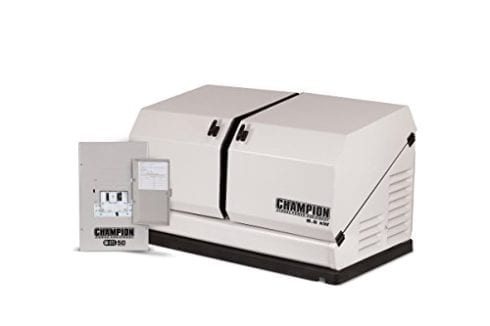
This home standby generator design uses a well-made automatic transfer switch to provide power during blackouts and outages, automatically returning to standby mode when the normal flow of power is restored. You have eight different circuits within the generator itself, all contained with a sub-panel that you can access at any time, and the built-in self-diagnostics allow the unit to make sure that it is working correctly.
A special alternator design can make sure that it won't produce more than 5% total harmonic distortion, giving you a way to power sensitive devices without damaging them. Even better, the entire system is protected from bad weather to offer full functionality in all seasons.
This is a great standby generator for keeping your home powered automatically during power outages, switching on and off as needed without any user input.
Check Price on Amazon ➞5. All Power America APGG10000 Power Backup Generator
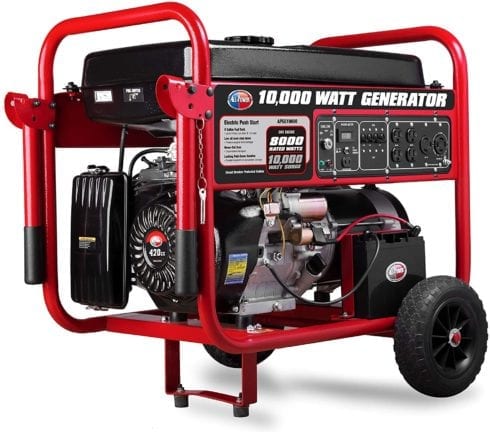
This emergency power generator can produce up to 8000 watts of rated power over several hours, giving you an 8-gallon fuel tank that can easily last for a long time when left to run at half capacity. The design also includes an hour meter, a battery that doesn't require extra maintenance, and a wheel kit to help you move the generator around.
A low operating noise level and a simple electronic start system make it a far more convenient option when you need to use it in emergency situations, while the corrosion-resistant metals used in the design make sure that the unit can last much longer regardless of the situation.
This generator combines a reliable and effective engine with useful features such as noise reduction, giving you great results in a user-friendly way.
Check Price on Amazon ➞6. Generac 70432 Home Standby Generator
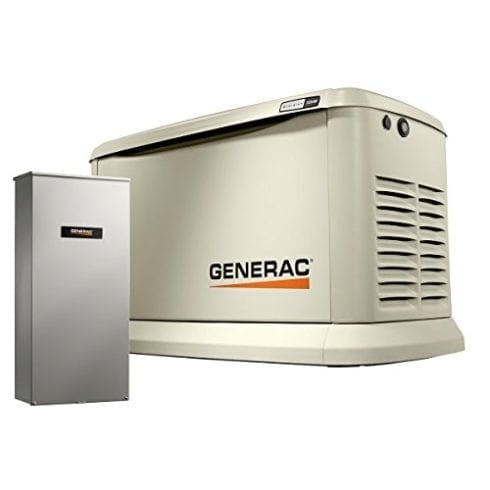
Like many Generac standby generators, this model uses a helpful LCD panel that allows you to track the current status of the whole house generator, seeing how recently it was maintained and whether or not it is running at full capacity. The automatic transfer switch means that it will turn on or off depending on the current state of power entering your home: if there is a power outage, it will automatically start generating power, then switch back into standby mode when normal power is restored. You can also link your phone to the generator to track its status in real-time, giving you a greater level of control.
The ability to properly monitor this generator makes it much easier to use in the long-term, especially during power outages.
Check Price on Amazon ➞7. Briggs & Stratton 30795 P4500 Inverter Generator
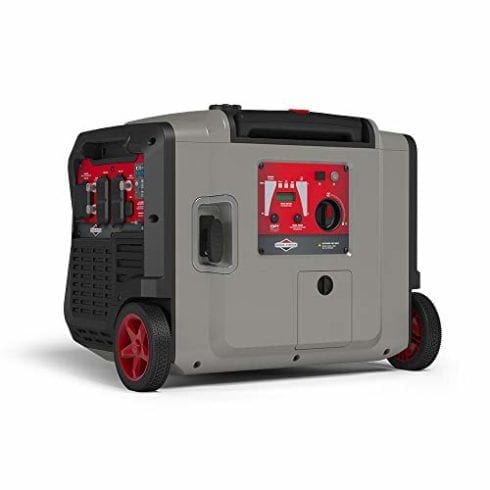
This simple and portable Briggs & Stratton whole house generator uses a wheeled Briggs & Stratton cart as part of its body, making it extremely easy to push around without leaving it exposed to the elements or other major sources of damage. The fuel-efficient design allows it to run for longer while using less gas, especially when running below 50% load.
Thanks to the reduced size and more compact design, it can easily fit into smaller areas, including the inside of your house. Multiple outlets, including two USB outlets and four 120-30A outlets, give you the ability to power multiple appliances and devices without needing an extra connector or power junction.
This Briggs & Stratton whole house generator strikes a balance between excellent power and a typical Briggs & Stratton design, generating power while being extremely easy to wheel around at any time.
Check Price on Amazon ➞8. Generac 5735 Portable Generator
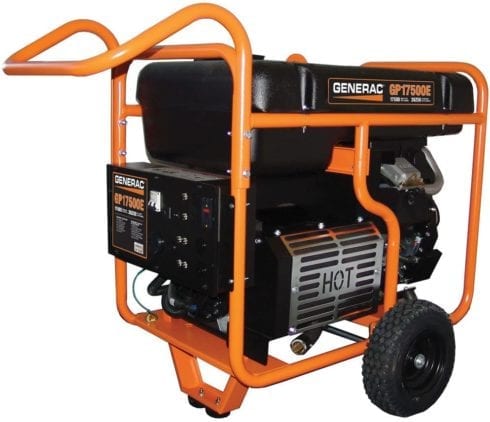
The high power output of this generator makes it an incredibly effective choice among all whole house generators, giving you more than enough power to keep large appliances running for hours without slowing down. The built-in hour meter and low-oil shutdown system make it much easier to use the generator effectively, and the steel cradle built around the body provides far more strength in day-to-day life.
A 16-gallon fuel tank and electric start also make it much easier to keep your appliances running throughout the day, giving you at least 10 hours at 50% load for maximum effectiveness in full power outage situations.
Unlike a lot of generators, this model is designed to provide a massive amount of power without sacrificing any other features, making it one of the best choices for emergencies.
Check Price on Amazon ➞9. Briggs & Stratton 40531 12kW Standby Generator
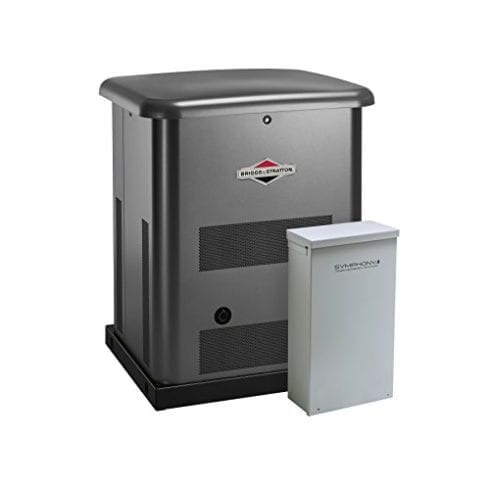
This Briggs & Stratton standby generator uses a 200 amp automatic transfer switch system that allows it to be installed both indoors and outdoors, providing plenty of power the moment there is a power outage or cut. Despite the compact Briggs & Stratton design, it can offer you up to 12000 watts of power and an excellent level of performance compared to most small generators.
The improved security and durability mean that the generator can get wet or bumped and still function properly. Thanks to the flexible placement options, it becomes much easier to install this generator wherever you like and still get the ideal level of performance from it.
This is an excellent option in terms of versatility, giving you great results and plenty of installation choices without forcing you into any specific style or location.
Check Price on Amazon ➞10. Generac 5685 Air-Cooled Standby Generator
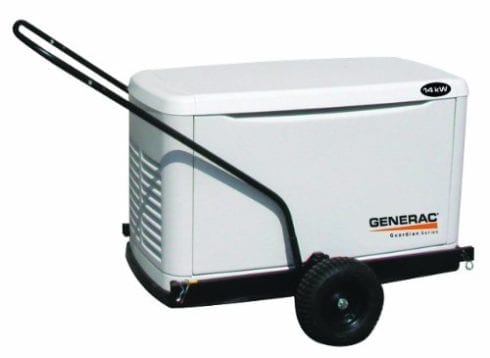
Using wheels and a large handle to make movement easier, this home standby generator cart allows you to quickly move any of Generac's generators around easily. While not a generator in and of itself, it can be the perfect option for people who want to use standby generators but don't have the time or resources to move them easily.
Designed to work with all of their air-cooled generator models, it leaves the ventilation areas accessible to improve airflow and prevent overheating. The wide handle and large wheels also mean that transporting heavy generators is a far less bumpy experience overall.
While it isn't a generator, this cart can be incredibly useful for people who are installing at least one large whole house generator, making the process far easier and less stressful.
Check Price on Amazon ➞Whole House Generators Buyer’s Guide
Buying a generator is never easy, especially when there are so many different factors that can go into how useful they will be. The best whole house generators might not even be the ones you expect when you look at the specifics of what they can offer, so it is extremely important to choose your generator based on what it can provide and how well it will work in the long-term.
To make your decision easier, there are some details that you can usually focus on to get the best possible example of what all whole house generators on the market might offer: taking it a step at a time can help you narrow down your search and slowly get you closer to finding the perfect option.
Generator Types
There are multiple “types” of generators that can apply in emergency situations, and they all operate in slightly different ways. Some are only supposed to work in specific ways, while others are made for various different purposes and can be adjusted to fit different roles or niches.
Standby Generators
Standby generators are almost always meant as emergency power options. Most standby generators use an automatic transfer switch system to activate when there is a power outage or a loss of electricity, starting up to provide backup energy to the whole house until normal power can be restored. Many standby generators will also return to standby mode once the regular electricity flow is detected, meaning that they will turn on and off whenever they are needed.
These are often the best whole house generators on the market since they are designed specifically to keep a whole home properly powered during emergencies or other issues. Because of this, they are also usually very large and powerful, which can make them less useful for people who are looking for portable generators instead.
Portable Generators
While they are an informal group, portable generators are usually the exact opposite of standby generators and whole house generator designs. They are much more mobile at the expense of being less powerful, making them better for powering specific things rather than an entire home. It is also important to remember that most whole house generators are designed for the express purpose of replacing your normal power source when it gets cut or fails, whereas a portable generator is more geared towards helping you run individual sets of appliances.
While they might not be the best whole house generator type in a conventional sense, most portable generators can still be extremely useful. For example, you might get one to make sure that you can still power your phones or other small devices during emergencies without having to install a larger generator on your home property.
Inverter Generators
Inverter generators are simply generators that use inverter systems in their design. They usually weigh less than most other types and won’t provide the same wattage, but they are also extremely compact and often work best when powering one or two devices at a time. Some are good enough to power appliances: for example, if you are worried about the food in your refrigerator going off because of a long power outage, an inverter generator might be able to run it for a day.
Size
The size of a generator may seem irrelevant, but it is one of the more important details when you are handling the purchasing and installation side of the process. Even without considering the functional differences, a larger whole house generator can take more effort to install and can’t be moved as easily, so you are usually forced to pick out a spot ahead of time. Smaller ones, especially those with wheels, can quite often be moved somewhere else very quickly but might have other disadvantages that make them less useful overall.
Larger generators are, in most cases, the more effective ones. Bigger whole house generators are often capable of powering almost the entire house, rather than just a few vital appliances and lights, which makes them incredibly useful as a backup or emergency power source. However, they are also very bulky, to the point that most of them have to be installed outdoors and can’ t be easily placed inside. They might make up for this by being resistant to weather and other forms of damage, but this can also leave them less accessible, given that they aren’t inside your home.
On the other hand, smaller portable generators trade power for mobility: they are much less powerful on the whole, but they can easily be moved from place to place and don’t usually have to be directly installed into a certain spot. This makes them far more useful in a smaller home or an area where you don’t have much land outside. The trade-off is that they don’t provide as much power in total, and won’t usually be able to keep as many large appliances running. Still, they can usually keep the vital items (such as lights, phones, etc.) running properly until everything is back to normal.
This isn’t always completely true, and some larger whole house generator models are designed in a way that can actually make them weaker than smaller ones. The size doesn’t matter as much as the components and engine inside, so don’t assume that size will consistently indicate how effective a particular unit will be.
Noise Level
Noise level is a minor detail, but it can make a big difference. Even if a whole house generator is placed outside, a loud enough design can be extremely irritating to live around, especially if you installed the generator close enough to make it audible through walls or windows. The same goes for indoor generators, too. Dealing with loud noises in the short-term isn’t bad, but some generators may need to be used for up to half a day or more at any one time. After a while, the constant droning, humming, and other noises that it might make can quickly wear you down.
There isn’t always an easy way to reduce noise artificially without moving the generator further away. Because of this, it is important to look at details like the noise level (calculated in decibels, or dB) to make sure you get one that you can stand. 65 dB is around the same level as a normal spoken conversation and is the preferred noise range for most people.
Fuel Type
The fuel used in generators can matter a lot, but that is fairly obvious to most people. What isn’t as obvious is the way that some generators can use multiple fuels, and how specific fuel types might be more effective than others in the same generator. The most common two fuel types you will see are gasoline and propane, two natural gas types that often get used as fuel. This natural gas fuel isn’t identical, though: not only are gasoline and propane two completely different natural gas types, but they work differently as fuel and won’t necessarily give you the same level of power when they are used in exactly the same way.
Also, keep in mind that many generators are designed to only accept one kind of fuel: using the wrong kind of natural gas in any generators can lead to serious problems. Gasoline, as natural gas, is one of the more common options in most areas. It can be much easier to get hold of considering that many vehicles also run on gasoline, and it can also be cheaper in a lot of situations. Gasoline is usually the cheaper of the two natural gas options, although propane can also be incredibly useful due to the fact that it doesn’t expire.
Keep in mind that neither gasoline or propane is actually a natural gas in the sense that they are purely a gas: instead, natural gas is part of the fuel process. Some generators might go a step further and use fuel like diesel. These are increasingly rare, but it can still be an option for some people, especially in areas where it can be much easier to get hold of diesel in general.
You can also sometimes convert a generator to use a specific type of natural gas, or find one that includes options for other natural gas and fuel types, but be warned that you will need to adapt them correctly if you want the right results. Using the wrong fuel or natural gas can lead to problems with the generator, including a high chance of it completely breaking.
What is the Average cost to have a Whole House Generator Installed?
No matter whether you get the worst or best whole house generator on the market, installation usually costs around the same depending on who you are hiring or working with to perform the installation. It can cost anything from $1200 to around $7000 depending on the exact circumstances of how you are installing it, how large the generator is, and what sort of connections need to be made. The project itself can end up costing only a few hundred dollars, but you have to remember that any generator can be tricky to install depending on how it works, and there is always a chance that certain things might bump the price up further.
Some generator designs, specifically those that can be mounted onto carts or easily installed on their own, can often be much cheaper as long as you know what you are doing. Keep in mind that you might still want to hire somebody to check over your generator installation. Even if you have a 5-year limited warranty, it is very easy for the said 5-year limited warranty to become void if you don’t install it correctly outside your home.
What Size Generator is Needed to Power a House?
Every generator is designed to provide a certain amount of power from whatever fuel it can use. Whether it uses natural gas or liquid fuel to create power, it is important to remember that size isn’t the only detail that matters. As mentioned above, standby generators are usually meant to be the best whole house generator option, although you might also find that a standby generator isn’t as portable as you’d like.
That being said, there is usually a cutoff point where a generator can’t power a house properly anymore: for example, if a generator only produces 5,000 watts of power, that is not going to be enough to power a home that needs 15,000 watts of power. 10,000 watts of power might be close enough to technically power the whole house (in the sense that all important items are turned on), so it doesn’t always need to be exactly perfect.
Are Whole House Generators Worth It?
Each band of whole house generator offers different things. Let’s use Champion Power Equipment as an example: Champion Power Equipment makes a lot of generators, offering a mixture of Champion Power Equipment portable generators alongside Champion Power Equipment home standby generator types. However, this doesn’t mean that either is necessarily going to be good for you, depending on what you need: if Champion Power Equipment doesn’t offer features you want, then there is no point buying one from them.
On the other hand, if Champion Power Equipment offers all of the features you want, then the price may be more then worth it. The point here is that every generator will be useful to somebody, and brands like Champion Power Equipment don’t have to appeal to everybody since there will always be people that see Champion Power Equipment generators as the best option for them. “Worth it” only applies if you can identify your needs and preferences properly.
The same can be said for any brand: Briggs & Stratton are another option that many people feel have a specific design or set of features they repeat, meaning that Briggs & Stratton can sometimes appeal to specific people over others. If you want to use Briggs & Stratton generators, then you should be aware that Briggs & Stratton often have specific niches they focus on.
Will a 20kW Generator Run my House?
A generator that offers 20,000 watts (or 20 kilowatts) will often be enough to power a smaller home, but this still depends on what you are powering with it. There are two things you will want: a transfer switch and a good level of harmonic distortion. A low distortion (usually below 5%) allows you to use your generator to charge small, sensitive devices, while a transfer switch is necessary to attach any natural gas or fuel standby generator to your home.
Every home is different, and the idea of “running your home” can change from person to person. Do you consider your mobile device part of your home? What about lights on the outside of your home? Does your home have an electronic heating system you want to power? Understand what you mean by “your home,” and it becomes much easier to find something that fits.
Conclusion
If you are still looking to fuel your home with electrical power in emergencies, then finding the best whole home generators should be a priority. It doesn’t matter if they use liquid natural gas as a fuel or rely entirely on some other source: as long as you can get the fuel into the generator and turn that fuel into power, you can keep your home running. Do your best to look for generators that will suit your home and don’t skip over any details if you can avoid it.
If none of the options above will power your home effectively, you can still use them as a starting point for your wider searches! There are so many generator power options out there that you are guaranteed to find a whole host of generator reviews or product pages that might lead you to the perfect option for your home. Don’t settle for second-best, especially if you want to make sure that your home will be prepared for emergencies and power outages.
Expert Tip
Most standby generator designs could take a while to warm up, and might need 10 seconds or so to toggle on (or, sometimes, around 10 seconds to fully turn off). This may be true with both a manual transfer switch and an automatic transfer switch since the unit won’t always be on standby mode.
Did You Know?
The limited warranty often has limits. Always check legal details like limited warranty and all rights reserved information, since even the smallest “limited warranty” or “all rights reserved” changes can alter which parts you are allowed to use to repair damaged generator components or surfaces.